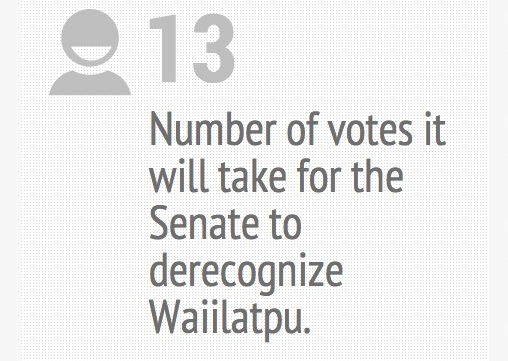After a budget appeals meeting on Wednesday night, the ASWC Finance Committee has decided not to grant Waiilatpu, Whitman’s yearbook, any additional funding for the 2013-14 academic year.
[iframe_loader src=”//infogr.am/Waiilatpu-a-Retrospective” width=”550″ height=”2097″ scrolling=”no” frameborder=”0″ style=”border:none;”]
The Student Affairs Committee will meet in the ASWC office at 8 p.m. on April 4 to vote on a by-law amendment which would derecognize Waiilatpu. The vote requires majority support in Student Affairs to pass to Senate, where it would have to meet 2/3 approval to pass. According to ASWC Finance Chair Sam Sadeghi, if the amendment does not pass, the Finance Committee will likely grant Waiilatpu $3,827, slightly less than the amount they appealed for at the Wednesday meeting.
Waiilatpu’s future was discussed at the Sunday, March 31 ASWC Senate meeting, after a preliminary ASWC budget allocated the yearbook only $150 out of a requested $7,383. This request represented a 45 percent decrease from the $13,350 that they received this year. $150 is the minimum amount that ASWC can grant a recognized campus organization unless it specifically requests less money.
According to Sadeghi, when allocating funds for the preliminary ASWC budget, the Finance Committee’s intention was to bring about discussion regarding the feasibility of the yearbook and the option of derecognizing the organization.
About half of the funds that Waiilatpu receives from ASWC is spent on publishing costs. This funding helps to subsidize the cost of the yearbook for students purchasing it.
Senior Ben Lerchin, co-founder and former editor-in-chief of Waiilatpu, said that in previous discussions with ASWC regarding yearbook funding, both parties had come to the conclusion that the yearbook would slowly become less dependent on ASWC in subsequent years. Lerchin believed that subsidizing the yearbook at the start would garner students’ investment, and over time Waiilatpu would raise the price of the yearbook so that they would no longer need ASWC to subsidize the yearbooks.
“The idea was that this would be a big investment and that as the yearbook became more established, ASWC wouldn’t be paying for publishing, and [they] might or might not be paying for staff stipends,” he said.
Sales were highest in 2010, the first year of the yearbook’s renewed existence. The organization sold 350 copies, 169 of which were pre-sales. The following year in 2011, Waiilatpu sold a total of 47 yearbooks, 32 of which were pre-sales. This year, Waiilatpu has sold 76 yearbooks in pre-sales, and current Waiilatpu Editor-in-Chief sophomore Grant Rommel plans to double this number when yearbook shipments come in.
According to Rommel, the main reason for low sales has been insufficient marketing. This year, Rommel has increased the number of pre-sale days with the hope of increasing excitement for the yearbook on campus.
“We started on advertising for the very beginning of the year and we’ve definitely made more of an effort this year to make the yearbook more visible,” Rommel said.
Rommel could not be reached for comment after the results of Wednesday night’s budget appeal meeting were announced by ASWC, slightly before 2 a.m. Thursday morning. Earlier in the week, he said the original allocation of $150 from ASWC and the discussion about derecognizing the yearbook were unexpected.
“I’m just frustrated that all of this came so suddenly, and at such a crucial time,” he said. “The short timeline for finalizing the budget and voting on keeping the yearbook coincides with the timeline of the yearbook––we’re planning on submitting our final pages next week. [It] has been really stressful.”
Rommel had been in contact with the ASWC Finance Committee since last Sunday’s Senate meeting and was told that the yearbook could be allocated up to $3,827 out of the $15,382 that ASWC had set aside for organizations looking to appeal their budgets.
“The meeting on Sunday seemed to take a turn in favor of the yearbook,” said Rommel. “Since it is a fairly new publication, it’s hard to establish a strong following in only three years.”
Rommel pointed out that the majority of yearbook customers are first-years and sophomores, indicating that there is a solid base of interest in the yearbook at Whitman.
“Most of our pre-order sales are freshman and sophomores, which goes to show that they’re the most excited and invested in buying a yearbook,” he said. “The major reason I would say that people don’t buy a yearbook is that they don’t feel a need to have one. And there’s a significant amount of people at Whitman who still remember that there was a time when Whitman didn’t have a yearbook.”
However, the results of the appeals meeting don’t add up with this promise.
Sadeghi’s main argument for wanting to derecognize the yearbook was because of low sales in the past two years. After Wednesday’s appeal meeting, he also said funding the yearbook was a lower priority for ASWC than ensuring that the travel and student development fund and other campus organizations had adequate funding.
In spite of Wednesday night’s developments, neither the yearbook’s funding nor its status as a campus media organization will be finalized until the Senate votes on the budget at their April 14 meeting.
4/4/13: Updated to correct the process for passing a bylaw amendment out of Student Affairs. Doing so requires a simple majority of the committee, not 2/3 as originally reported.
*Sarah Cornett, Blair Hanley Frank and Rachel Alexander contributed additional reporting.












